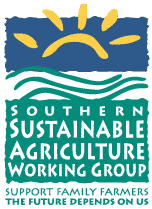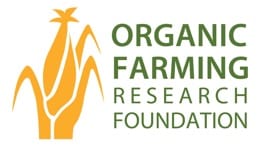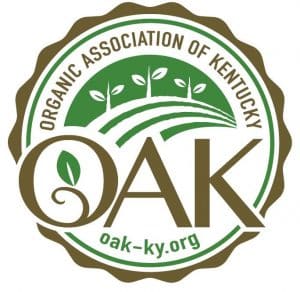We are blessed to be part of a movement that provides wholesome foods to those that appreciate their value while caring for the earth as Mother Nature intended. It is rewarding to be part of a sustainable food-farming community that is willing to openly share ideas and information, even though our collective customer base is relatively small. We would not be able to provide you all that we do, as farming is an isolating profession by definition, were it not for the technical advice and moral support from our friends and the nonprofit organizations of which we are a part.
 Years ago, our transition to organic farming began with a few simple “sustainable” farming practices. We were kinda feeling our way along in the dark, hoping things would work in our favor, as organic farming was not something that was often talked about among farmer circles. Then we discovered the Southern Sustainable Agricultural Working Group (SSAWG). This nonprofit organization hosted an annual educational conference every January for growers, just like us, who were looking for advice and validation that we were on the right track.
Years ago, our transition to organic farming began with a few simple “sustainable” farming practices. We were kinda feeling our way along in the dark, hoping things would work in our favor, as organic farming was not something that was often talked about among farmer circles. Then we discovered the Southern Sustainable Agricultural Working Group (SSAWG). This nonprofit organization hosted an annual educational conference every January for growers, just like us, who were looking for advice and validation that we were on the right track.
Now, some two decades later, Lexington will host well over 1,200 kindred SSAWG spirits from around the Southeast and beyond in late January. This is about a thousand more than came here in the ‘90s, when they found us wandering about. John, Ann and I have held various leadership roles within the organization, given presentations, hosted tours and engaged in multi-state programs over the years. This is proof positive that if you give of yourself, it will come back multi-fold. Not only do we look forward to learning from our peers each year, but connecting with friends from other states recharges our batteries and motivates us to try new ideas, grow new varieties and connect with our customers in new ways.
Side note: Ann and I met at the SSAWG Conference in Memphis, Tenn., in 1997, when she sat by me in the front row of a presentation we were each interested in hearing. We discovered we lived 30 miles apart, and the rest is history in the making.
As SSAWG was bringing credibility to the sustainable-agriculture movement, land-grant universities—like the University of Kentucky, Kentucky State University and their counterparts around the Southeast—began to establish research and educational-outreach programs to support this growing quest for agricultural knowledge. The problem was, much of what was driving agricultural-research priorities was based on validation of new chemical and genetic-modification technologies. Be they entomologists or agronomists or animal scientists, individuals within the university and US Department of Agriculture (USDA) bureaucracies learned from our organic-farming successes and began to quietly find the resources to design research projects to prove to their peers there is something to all this. Lo and behold, there became statistically significant data showing we were getting the right results.
 Funding for this type of research was hard to come by. The Organic Farming Research Foundation (OFRF), a nonprofit organization based in Santa Cruz, Cali., was formed partly to financially support small research projects around the country. OFRF also advocates for more equitable funding for organic research in the halls of Congress, with some success. I was fortunate to have been on the board of directors of OFRF several years back, affording me an opportunity to learn from amazing farmers around the country, witness their successful operations and bring it back to Kentucky.
Funding for this type of research was hard to come by. The Organic Farming Research Foundation (OFRF), a nonprofit organization based in Santa Cruz, Cali., was formed partly to financially support small research projects around the country. OFRF also advocates for more equitable funding for organic research in the halls of Congress, with some success. I was fortunate to have been on the board of directors of OFRF several years back, affording me an opportunity to learn from amazing farmers around the country, witness their successful operations and bring it back to Kentucky.
Because of OFRF’s leadership and partnerships with numerous other organizations, the USDA now provides funds for organic research projects, dedicates cost-share funds for organic-farm environmental-infrastructure projects and fully funds the National Organic Program, which oversees organic regulations worldwide.
 Closer to home, the Organic Association of Kentucky (OAK), of which I am currently president, has some 300 members that are organized to help each other be better farmers and to educate consumers about the value of consuming organic foods. Beyond membership dues, OAK’s programming is dependent on private donations and some newly available USDA grants to support organic-farming development. OAK has trained several people to go farm-to-farm to help farmers transition out of their chemical dependency and into environmentally friendly farming systems. OAK also hosts an annual conference the first weekend in March, where we have Kentucky-centric educational sessions, bring buyers and growers together, and host programs for consumers on the health benefits of eating organic foods. Faculty and staff at KSU, UK and Berea College interested in organic farming systems are advisors to the farmer-driven OAK Board of Directors.
Closer to home, the Organic Association of Kentucky (OAK), of which I am currently president, has some 300 members that are organized to help each other be better farmers and to educate consumers about the value of consuming organic foods. Beyond membership dues, OAK’s programming is dependent on private donations and some newly available USDA grants to support organic-farming development. OAK has trained several people to go farm-to-farm to help farmers transition out of their chemical dependency and into environmentally friendly farming systems. OAK also hosts an annual conference the first weekend in March, where we have Kentucky-centric educational sessions, bring buyers and growers together, and host programs for consumers on the health benefits of eating organic foods. Faculty and staff at KSU, UK and Berea College interested in organic farming systems are advisors to the farmer-driven OAK Board of Directors.
None of this shift in thinking, redirecting of funds and priority setting would have happened without your interest to support sensible food. You have voted with your food choices and CSA shareholding support of Elmwood Stock Farm through our transition to an entirely organic farming system. Our shared responsibility to care for the earth while providing sustenance has helped to pave the path to prioritize state and federal funding to support the good-food movement. Your desire to demand food be grown without the release of toxins in the environment and on/in your food has inspired countless farmers around the country to reduce or eliminate their use, while changing public perception and public policy about the real cost of real food.
We want to thank the environmental-activist farmer pioneers that took arrows in the back from the mainstream agricultural establishment to open everyone’s eyes to the possibilities of farming this way. Without them, and the organizations they developed, we might not have had the confidence to take our own ideas further. We devote a great deal of time, energy and financial support to these organizations, as a way of giving back for all we have gained, and you might choose to do so, as well. None of us can go it alone. —Mac Stone


Made with 
